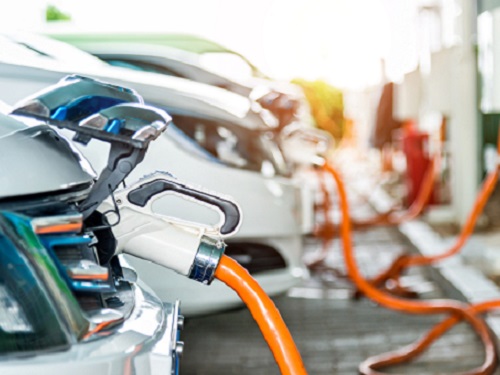The Federal Highway Administration recently issued a notice of funding opportunity for its new Charging and Fueling Infrastructure or CFI discretionary grant program to fund electric vehicle or EV charging and alternative-fueling infrastructure in communities across the country and along designated highways, interstates, and major roadways.
[Above image via the FHWA]
FHWA said this grant program represents a “key step” towards achieving President Biden’s goals of building a national network of 500,000 public EV charging stations by 2030.

The CFI grant program, established by the $1.2 trillion Infrastructure Investment and Jobs Act enacted in November 2021, will provide $2.5 billion over five years to a wide range of applicants, including cities, counties, local governments, and tribes.
This initial round of funding makes up to $700 million from fiscal years 2022 and 2023 funding available to “strategically deploy” EV charging and other alternative vehicle-fueling infrastructure projects in publicly accessible locations in urban and rural communities, as well as along designated Alternative Fuel Corridors or AFCs.
The IIJA divides the CFI program into two distinct grant funding categories, requiring that 50 percent of the funding over five years is made available for each.

The first is the “Community Program,” which will provide $1.25 billion to deploy publicly accessible EV charging infrastructure, and hydrogen, propane, or natural gas fueling infrastructure in communities. Infrastructure may be located on any public road or in other publicly accessible locations such as parking facilities at public buildings, public schools, and public parks, or in publicly accessible parking facilities owned or managed by a private entity.
The second is the “Corridor Program,” which will provide $1.25 billion to deploy publicly accessible EV charging infrastructure and hydrogen, propane, and natural gas fueling infrastructure along designated AFCs.
The CFI program builds on the $5 billion National Electric Vehicle Infrastructure or NEVI formula program, launched in February 2022, for which FHWA recently finalized minimum standards.
[Editor’s note: State departments of transportation provided key feedback in January 2022 to FHWA to help craft those new EV charging standards.]

EV chargers constructed with CFI funds must adhere to those same standards, a requirement that supports a consistent charging experience for users and ensures that the U.S. EV charging network is “convenient, reliable, and ‘Made in America,’” according to FHWA Administrator Shailen Bhatt.
He added that a “priority” of the CFI program is bringing EV charging into urban and rural communities, downtown areas and local neighborhoods, particularly in underserved and disadvantaged communities, as well as to designated alternative fuel corridors.
“FHWA is committed to helping towns and cities, large and small, build modern, sustainable infrastructure that promotes equity and opportunity for their local economies and net-zero emissions for the nation by 2050,” Bhatt said in a statement.
“By encouraging the adoption and expansion of EV charging and alternative fuels, CFI program investments have the potential to significantly address the transportation sector’s outsized contributions to climate change,” he noted.



